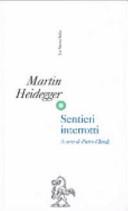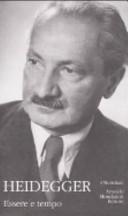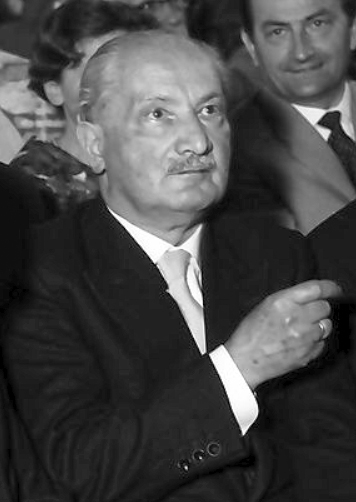Lavori

Sentieri interrotti
Martin Heidegger
Essere e tempo
Martin HeideggerLetter on Humanism
Martin HeideggerMartin Heidegger frasi celebri
La sentenza di Nietzsche «Dio è morto», La Nuova Italia, Firenze 1979, p. 246
Sentieri interrotti
“Solo se davvero erriamo – ci perdiamo, possiamo imbatterci nella "verità."”
[...]
Nur wenn wir wirklich irren – in die Irre gehen, können wir auf »Wahrheit« stoßen. [...]
Origine: Da Schwarze Hefte, Überlegungen II, n° 23, ottobre 1931; in Gesamtausgabe, vol. 94, a cura di Peter Trowny. Francoforte sul Meno, Vittorio Klosterman GmbH, 2014, p. 13.
Frasi su come pensare di Martin Heidegger
Letter on Humanism
“Lo psichiatra ha bisogno dello psichiatra.”
citato in Roudinesco Elisabeth, Jacques Lacan. Profilo di una vita, storia di un sistema di pensiero, Cortina, 1995
citato in Risposta [a colloquio con Martin Heidegger], traduzione di Carlo Tatasciore, Guida, Napoli, 1992, pp. 267-268. ISBN 978-88-6042-258-3
Frasi su tempo di Martin Heidegger
da Il concetto di tempo, 1924, Adelphi
dalle Lezioni del semestre invernale 1937-38
Origine: Soggiorni, p. 24
Occident] e dell'"Oriente" e attraverso ciò che è europeo – il luogo della storia futura più originariamente conforme al destino [geschickt]? (Il detto di Anassimandro, 1946, p. 303)
da La questione dell'essere, in Oltre la linea
Origine: Fra tutti gli ospiti.
Martin Heidegger Frasi e Citazioni
“Il linguaggio è la casa dell'essere e nella sua dimora abita l'uomo.”
dalla Lettera sull'umanismo
“Il Sacro congiunge il Divino. Il Divino avvicina Dio.”
Perché i poeti?
Sentieri interrotti
“[…] io sono un «teologo cristiano»”
da una lettera del 19 agosto 1921 a Karl Löwith
Origine: Citato in Franco Volpi, Guida a Heidegger: [Ermeneutica, Fenomenologia, Esistenzialismo, Ontologia, Teologia, Estetica, Etica, Tecnica, Nichilismo], Laterza, Bari-Roma, 2018, p. 62 https://books.google.it/books?id=Kk9tDwAAQBAJ&lpg=PT62&dq=&pg=PT62#v=onepage&q&f=false. ISBN 9788858134306
Essere e tempo
"... Dicterische Wohnet der Mensch ..."; citato in George Steiner, Dopo Babele, p. IX
da Che cosa significa pensare?, in Saggi e discorsi
da Nietzsche, traduzione di F. Volpi, Adelphi, Milano, 1995
L'epoca dell'immagine del mondo
Sentieri interrotti
L'epoca dell'immagine del mondo
Sentieri interrotti
da una lettera a Hans-Georg Gadamer del 2 dicembre 1971, in: Gadamer, La dialettica di Hegel, traduzione di R. Dottori, Marietti, Genova 1996, p. 187
da Ormai solo un dio ci può salvare, traduzione di A. Marini, Guanda, Parma
da Solo un dio ci può salvare, Guanda, Parma 1987, p. 137
“L'uomo è il pastore dell'Essere.”
dalla Lettera sull'umanismo, a cura di Franco Volpi, Adelphi, Milano 1995, p. 56
citato in Ann van Sevenant, Il filosofo dei poeti: l'estetica di Benjamin Fondane, Mimesis, 1994
da Beitrage Zur Philosophie: Vom Ereignis, 1938, in Contributions to philosophy: from enowning, Indiana University Press, 1999, p. 123
citato in Ralf Dahrendorf, Erasmiani, traduzione di M. Sampaolo, p. 6
citato in Georg Trakl, Poesie, introduzione, traduzione e note di Ervino Pocar, Rizzoli, Milano, 1974, p. 155
“La tecnica è la forma più raffinata della più durevole proletarizzazione.”
Origine: MARTIN HEIDEGGER, Riflessioni XII-XV, Bompiani, 2016, pag. 163
Martin Heidegger: Frasi in inglese
“Why are there beings at all, and why not rather nothing? That is the question.”
Warum ist überhaupt Seiendes und nicht vielmehr Nichts? Das ist die Frage.
What is Metaphysics? (1929), p. 110
Cf. Gottfried Leibniz, De rerum originatione radicali (1697)ː "cur aliquid potius extiterit quam nihil."
Origine: Introduction to Metaphysics
“Making itself intelligible is suicide for philosophy.”
Contributions to Philosophy (From Enowning) [Beitrage Zur Philosophie (Vom Ereignis)], notes of 1936–1938, as translated by Parvis Emad and Kenneth Maly (1989)
Contesto: Making itself intelligible is suicide for philosophy. Those who idolize "facts" never notice that their idols only shine in a borrowed light.
Contesto: Those in the crossing must in the end know what is mistaken by all urging for intelligibility: that every thinking of being, all philosophy, can never be confirmed by "facts," ie, by beings. Making itself intelligible is suicide for philosophy. Those who idolize "facts" never notice that their idols only shine in a borrowed light. They are also meant not to notice this; for thereupon they would have to be at a loss and therefore useless. But idolizers and idols are used wherever gods are in flight and so announce their nearness.
“The most thought-provoking thing in our thought-provoking time is that we are still not thinking.”
Das Bedenklichste in unserer bedenklichen Zeit ist, dass wir noch nicht denken.
What is Called Thinking? [Was heisst Denken?] (1951–1952), as translated by Fred D. Wieck and J. Glenn Gray (1968)
Basic Questions of Philosophy: Selected "Problems" of "Logic" (Grundfragen der Philosophie: Ausgewählte "Probleme" der "Logik" (1984), translated by Richard Rojcewicz and André Schuwer, Indiana University Press, 1994, ISBN 0253004381, p. 7)
Origine: Basic Writings: Martin Heidegger
Origine: Nietzsche (1961), p. 127
“The human being is not the lord of beings, but the shepherd of Being.”
Letter on Humanism (1947)
The Principle of Reason (1955–1956) as translated by Reginald Lilly (1991) <!-- Bloomington: Indiana UP -->
Contesto: The Geschick of being: a child that plays... Why does it play, the great child of the world-play Heraclitus brought into view in the aiôn? It plays, because it plays. The "because" withers away in the play. The play is without "why." It plays since it plays. It simply remains a play: the most elevated and the most profound. But this "simply" is everything, the one, the only... The question remains whether and how we, hearing the movements of this play, play along and accommodate ourselves to the play.
Interview (23 September 1966), published posthumously in Der Spiegel (31 May 1976), as translated by Maria P. Alter and John D. Caputo in The Heidegger Controversy : A Critical Reader (1991), edited by Richard Wolin.
Contesto: Philosophy will not be able to effect an immediate transformation of the present condition of the world. This is not only true of philosophy, but of all merely human thought and endeavor. Only a god can save us. The sole possibility that is left for us is to prepare a sort of readiness, through thinking and poeticizing, for the appearance of the god or for the absence of the god in the time of foundering [Untergang] for in the face of the god who is absent, we founder. Only a God Can Save Us.
“Everywhere we remain unfree and chained to technology, whether we passionately affirm or deny it.”
The Question Concerning Technology (1954)
Contesto: Everywhere we remain unfree and chained to technology, whether we passionately affirm or deny it. But we are delivered over to it in the worst possible way when we regard it as something neutral; for this conception of it, to which today we particularly like to do homage, makes us utterly blind to the essence of technology.
Origine: Nietzsche (1961), p. 35
“The possible ranks higher than the actual.”
Introduction
Being and Time (1927)
Origine: Nietzsche (1961), p. 70
Origine: Nietzsche (1961), p. 19
